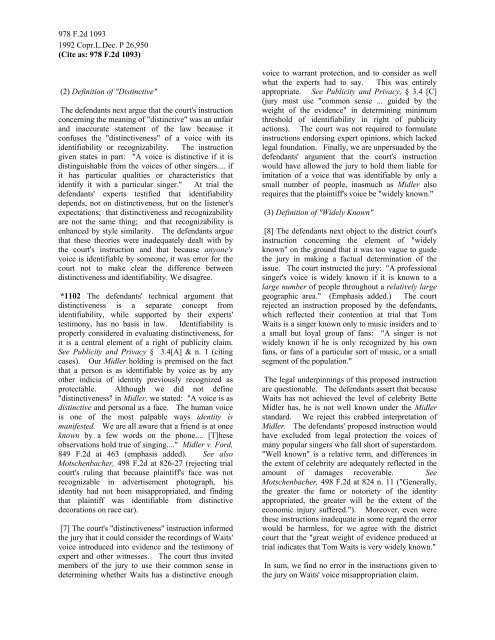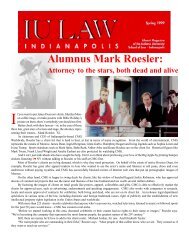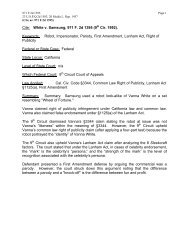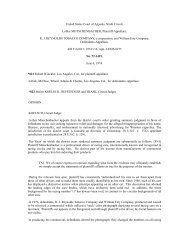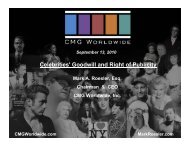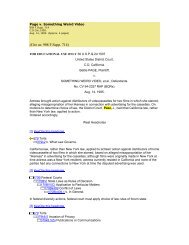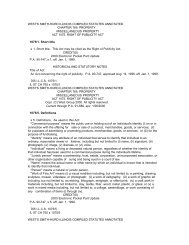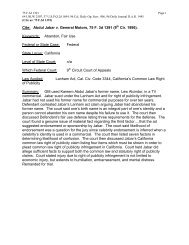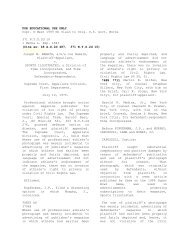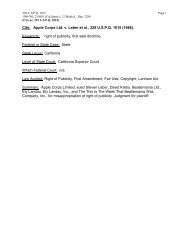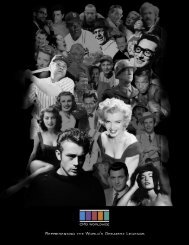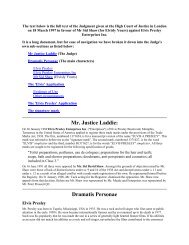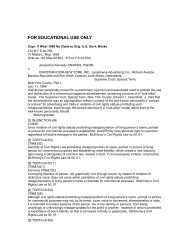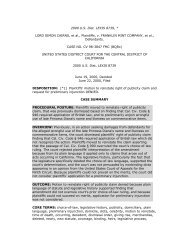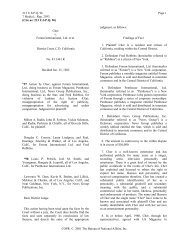Cite: Waits v. Frito Lay, 978 F. 2d 1093 (9th Cir. 1992 ... - Mark Roesler
Cite: Waits v. Frito Lay, 978 F. 2d 1093 (9th Cir. 1992 ... - Mark Roesler
Cite: Waits v. Frito Lay, 978 F. 2d 1093 (9th Cir. 1992 ... - Mark Roesler
Create successful ePaper yourself
Turn your PDF publications into a flip-book with our unique Google optimized e-Paper software.
<strong>978</strong> F.<strong>2d</strong> <strong>1093</strong><br />
<strong>1992</strong> Copr.L.Dec. P 26,950<br />
(<strong>Cite</strong> as: <strong>978</strong> F.<strong>2d</strong> <strong>1093</strong>)<br />
(2) Definition of "Distinctive"<br />
The defendants next argue that the court's instruction<br />
concerning the meaning of "distinctive" was an unfair<br />
and inaccurate statement of the law because it<br />
confuses the "distinctiveness" of a voice with its<br />
identifiability or recognizability. The instruction<br />
given states in part: "A voice is distinctive if it is<br />
distinguishable from the voices of other singers.... if<br />
it has particular qualities or characteristics that<br />
identify it with a particular singer." At trial the<br />
defendants' experts testified that identifiability<br />
depends, not on distinctiveness, but on the listener's<br />
expectations; that distinctiveness and recognizability<br />
are not the same thing; and that recognizability is<br />
enhanced by style similarity. The defendants argue<br />
that these theories were inadequately dealt with by<br />
the court's instruction and that because anyone's<br />
voice is identifiable by someone, it was error for the<br />
court not to make clear the difference between<br />
distinctiveness and identifiability. We disagree.<br />
*1102 The defendants' technical argument that<br />
distinctiveness is a separate concept from<br />
identifiability, while supported by their experts'<br />
testimony, has no basis in law. Identifiability is<br />
properly considered in evaluating distinctiveness, for<br />
it is a central element of a right of publicity claim.<br />
See Publicity and Privacy § 3.4[A] & n. 1 (citing<br />
cases). Our Midler holding is premised on the fact<br />
that a person is as identifiable by voice as by any<br />
other indicia of identity previously recognized as<br />
protectable. Although we did not define<br />
"distinctiveness" in Midler, we stated: "A voice is as<br />
distinctive and personal as a face. The human voice<br />
is one of the most palpable ways identity is<br />
manifested. We are all aware that a friend is at once<br />
known by a few words on the phone.... [T]hese<br />
observations hold true of singing...." Midler v. Ford,<br />
849 F.<strong>2d</strong> at 463 (emphasis added). See also<br />
Motschenbacher, 498 F.<strong>2d</strong> at 826-27 (rejecting trial<br />
court's ruling that because plaintiff's face was not<br />
recognizable in advertisement photograph, his<br />
identity had not been misappropriated, and finding<br />
that plaintiff was identifiable from distinctive<br />
decorations on race car).<br />
[7] The court's "distinctiveness" instruction informed<br />
the jury that it could consider the recordings of <strong>Waits</strong>'<br />
voice introduced into evidence and the testimony of<br />
expert and other witnesses. The court thus invited<br />
members of the jury to use their common sense in<br />
determining whether <strong>Waits</strong> has a distinctive enough<br />
voice to warrant protection, and to consider as well<br />
what the experts had to say. This was entirely<br />
appropriate. See Publicity and Privacy, § 3.4 [C]<br />
(jury must use "common sense ... guided by the<br />
weight of the evidence" in determining minimum<br />
threshold of identifiability in right of publicity<br />
actions). The court was not required to formulate<br />
instructions endorsing expert opinions, which lacked<br />
legal foundation. Finally, we are unpersuaded by the<br />
defendants' argument that the court's instruction<br />
would have allowed the jury to hold them liable for<br />
imitation of a voice that was identifiable by only a<br />
small number of people, inasmuch as Midler also<br />
requires that the plaintiff's voice be "widely known."<br />
(3) Definition of "Widely Known"<br />
[8] The defendants next object to the district court's<br />
instruction concerning the element of "widely<br />
known" on the ground that it was too vague to guide<br />
the jury in making a factual determination of the<br />
issue. The court instructed the jury: "A professional<br />
singer's voice is widely known if it is known to a<br />
large number of people throughout a relatively large<br />
geographic area." (Emphasis added.) The court<br />
rejected an instruction proposed by the defendants,<br />
which reflected their contention at trial that Tom<br />
<strong>Waits</strong> is a singer known only to music insiders and to<br />
a small but loyal group of fans: "A singer is not<br />
widely known if he is only recognized by his own<br />
fans, or fans of a particular sort of music, or a small<br />
segment of the population."<br />
The legal underpinnings of this proposed instruction<br />
are questionable. The defendants assert that because<br />
<strong>Waits</strong> has not achieved the level of celebrity Bette<br />
Midler has, he is not well known under the Midler<br />
standard. We reject this crabbed interpretation of<br />
Midler. The defendants' proposed instruction would<br />
have excluded from legal protection the voices of<br />
many popular singers who fall short of superstardom.<br />
"Well known" is a relative term, and differences in<br />
the extent of celebrity are adequately reflected in the<br />
amount of damages recoverable. See<br />
Motschenbacher, 498 F.<strong>2d</strong> at 824 n. 11 ("Generally,<br />
the greater the fame or notoriety of the identity<br />
appropriated, the greater will be the extent of the<br />
economic injury suffered."). Moreover, even were<br />
these instructions inadequate in some regard the error<br />
would be harmless, for we agree with the district<br />
court that the "great weight of evidence produced at<br />
trial indicates that Tom <strong>Waits</strong> is very widely known."<br />
In sum, we find no error in the instructions given to<br />
the jury on <strong>Waits</strong>' voice misappropriation claim.


